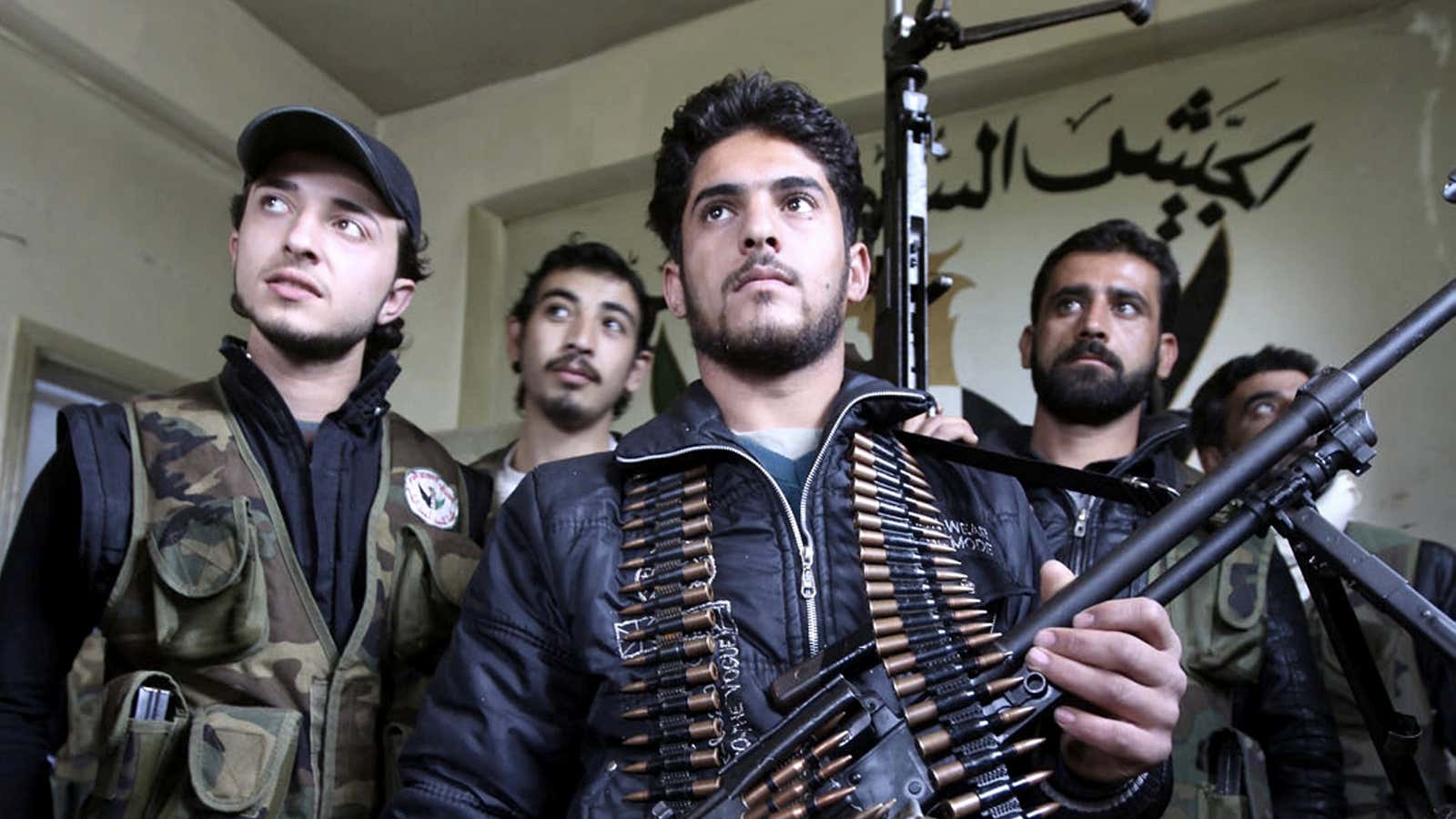When news broke that the US Central Intelligence Agency will soon begin funneling weapons to vetted Syrian rebels by way of Jordan, our next logical question was: How does one vet a Syrian rebel?
The CIA has been in the business of arming rebel groups for many decades, but often with very mixed results. Books will probably be written about what a bad idea it is for Washington and its allies to dole out weapons to a fractured, contentious and unaccountable group of Syrian fighters, especially after waiting for so long.
Although the US government isn’t saying how many rebels will be vetted, the program’s success could dramatically impact how the situation in Syria turns out. Three former CIA officials who have spent decades on the ground doing it say the upcoming campaign will be a crapshoot at best.
On paper, the vetting process is straightforward, says one former CIA case officer who is a veteran of the war in Afghanistan and other US military campaigns. It starts with checking with local and regional law enforcement and intelligence officials about whether the candidates have criminal backgrounds, terrorist connections or ties to organized crime and trafficking in drugs, humans or weapons.
Then comes the harder part: assessing the character and softer details of a rebel fighter’s past. Do they have extremist views? Who do they associate with? What is their employment history? Their emotional stability? Do they have experience with fighting and the use of weapons? For each candidate, that kind of information gathering can take days or even weeks in the case of potential senior commanders. “It is a substantial amount of work and you’re never done,” the former CIA case officer tells Quartz. “You have to constantly keep validating them based on new information you get.”
Here are some of the pitfalls to getting the vetting right:
- Too little information. The CIA has far less “ground truth” or accurate information on the complicated dynamics of Syria’s rebel Supreme Military Council (SMC) and other opposition groups than it did in Afghanistan, Iraq or even Libya. A second CIA case officer who spent decades on the ground in the Middle East tells Quartz the agency is essentially flying blind in Syria. “There’s nobody with area knowledge left… the people who used to know the Middle East aren’t there any more,” he says. “And the new ones aren’t learning. They sit in the embassies.”
- Too many groups. There are dozens of overlapping opposition organizations, including locally based militias, bandit groups, bands of former Syrian military fighters and al Qaeda affiliates and sympathizers. Among the challenges: figuring out how they interact, who’s running them, which are linked to atrocities, and who their foot-soldiers are. “You can do a great job of due diligence on this but because of the hugely complex and conflicting agendas, political and personal, you’re just rolling the dice,’’ the former CIA Afghanistan officer says.
- Too little control. The leadership of the Free Syrian Army is inexperienced and disorganized. Many of its soldiers are Syrian army defectors who work in small, independent cells throughout the country that are not accountable to any central authority. Washington will have to rely on relatively untested leaders like Gen. Salim Idris, the top Syrian rebel commander and former military engineer, whose command of his forces is questionable.
- Too many religions. Everyone knows the rebels hate Assad. What is harder to quantify is the degree to which they hate each other, especially if Assad falls and Syria becomes a free-for-all like Iraq. The mix of Sunnis, Shi’ites, Christians, Kurds, Druze and Alawite could easily lead to civil war, but it’s hard to weed out potential troublemakers based on ethnic divisions.
- Too much bad blood. Washington has a fraught relationship with Syria, especially considering Iran and Hezbollah’s influence in the country. As a result, some of the fighters may end up abusing the vetting process to obtain weapons they can then use against the US and its allies, as was the case in the Afghan-Soviet conflict in the 1980s.
- Too much money. No amount of vetting can determine who will be a hero, a coward or a mercenary turncoat that sells his weapons for cash. Some people get into the rebel game for the money. Others go in with good intentions, don’t like it and decide to sell their weapons on their way out.
- Too many agendas. A lot of energy in the vetting process is spent investigating and excluding innocent people. “What they’ll end up doing is asking people on the ground,” the CIA Afghanistan officer says. “And the big problem, and we saw this all the time in Afghanistan, is that people will say he’s al Qaeda, and we’d find they just had a grudge against the guy and were hoping the US government takes care of their problems for them.”
- Too many unknowns. Some seemingly sane people go nuts when you give them weapons and a few minions to boss around. The CIA Afghanistan officer says Abu Musab al-Zarqawi was a “little punk thug” who quickly rose from video store clerk to become one of al Qaeda in Iraq’s deadliest leaders. Until then, he says, “no one had anything on him. And in these situations low level pissants can move up very quickly If they are effective.’’ The former Middle East CIA officer agrees: “It’s pretty easy to weed out the crazies. But the problem is the people who are presented to you as being reasonable and who seem reasonable, but then you find out later that they have associations that make you very uncomfortable.”




